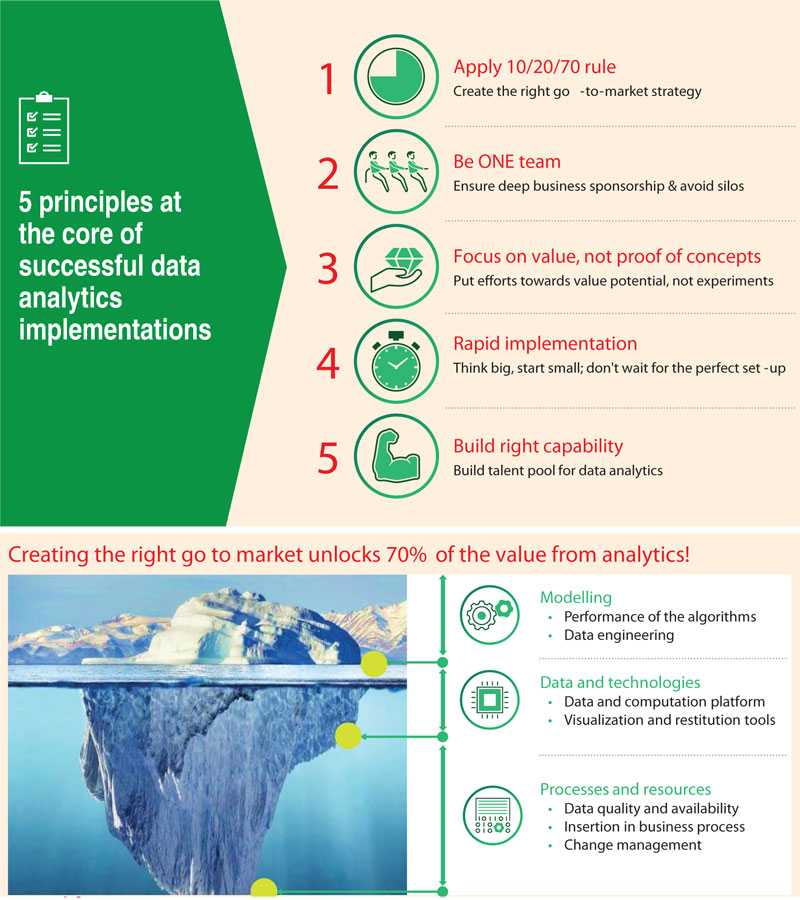Sunday Feb 15, 2026
Sunday Feb 15, 2026
Wednesday, 7 April 2021 00:00 - - {{hitsCtrl.values.hits}}

Boston Consulting Group Principal Chilman Jain and Boston Consulting Group Managing Director and Partner Prateek Roongta write about the integral role of analytics in a data rich world and postulate that only companies with the ability to take data-driven decisions will win in the new decade. They also highlight the five principles that lie at the core of successful analytics implementations.
 |
| Boston Consulting Group Principal Chilman Jain |
 |
| Boston Consulting Group MD and Partner Prateek Roongta |
Data is abundant – generated through a growing array of sensors, applications, and business models. However, companies that leverage data and analytics to transform their businesses are limited. Those that are digitally mature live and breathe data. They are aware that to understand and meet the customers’ nuanced needs, it is critical to build capabilities that can turn data into actionable insights.
This has become even more relevant today, in the aftermath of the pandemic. Leaders agree that the recovery across sectors would be uneven and that digital channels would be key to securing organisations’ financial footing and driving growth. Far more questions need to be answered real time in the evolving scenario:
By leveraging data and analytics to drive meaningful insights and designing logical strategies, an organisation can become future ready. For example, a leading insurance company wanted to use data to improve decision making in customer service, for fraud detection, and for pricing insurance plan premiums. BCG’s data experts developed algorithms that delivered more than €10 million in value, helped double the improvement in fraud detection, and facilitated the hiring of 50+ digitally skilled employees.
AI is one of the most potent forms of data analytics. By helping companies detect—and even anticipate—behaviour and patterns, AI has transformed areas like customer service, retail analytics, and industrial automation. Yet only 10% of companies succeed with AI.
The problem: many organisations find it difficult to extend AI deeper into their operations. Becoming a data-driven company requires relentless focus and can sound daunting. However, we have found the five principles that we believe are needed to win:
1.Apply the 10-20-70 rule – Create the right go-to-market strategy
Our approach is encapsulated in our 10-20-70 rule. Winning with analytics means dedicating 10% of your investment to modelling and algorithms, 20% to data and technologies, and 70% to embedding data analytics into business processes and ways of working. Technical aspects like data engineering, data platform and visualisation tools only contribute to 30% of the value generation. The real value lies in creating the right go-to-market plan, and revamping business processes by adopting change management.
2.Be ONE team – Ensure deep business sponsorship and avoid silos
Without business sponsorship and executive buy-in, it is not possible to implement data analytics successfully. It is imperative to onboard the senior leadership – right from the CEO to the Heads of Departments – from Day 1.
Additionally, to successfully leverage data, businesses should focus on cross-functional collaboration. They should create agile working teams with representation from key business functions as opposed to just setting up a dedicated data analytics team. It is important to facilitate continuous communicate between all functional areas and share learnings transparently.
3.Focus on value, not proof of concepts – Put efforts towards value potential, not experiments
We recommend our clients start with concrete use cases that allow them to solve real business problems, as opposed to spending time and effort on pilots. Step 1 to this end would be identifying a long list of use cases across the business value chain. Next, prioritise few use cases basis feasibility of implementation and business impact potential.
Post this, the working teams should adopt an iterative approach starting with 1-2 key use cases to prove value and build capability. In parallel, they can build the data platform needed to scale the capabilities and implement more use cases over time.
4.Rapid implementation – think big, start small; don’t wait for the perfect set-up
We suggest starting small to prove value rather than waiting for every data attribute to be available. Teams should determine select high value business use cases where data is likely to be easily accessible and for which value can be distilled quickly.
Ramping up in quick, short sprints and showcasing MVPs for confirming potential should be the next step. Businesses can keep these use cases live while developing a self-funding analytics journey.
5.Build right capability – create talent pool for data analytics
Last but not the least, is the need to source domain experts with relevant data-science experience. The first step towards this is conducting a skills-gap assessment in-house to gauge if the existing workforce has the requisite data analytics capabilities, and prior experience with next-gen technologies like AI. Post this, recruit cutting edge specialists with niche skills to bridge the capabilities gap. Third-party talent networks can be leveraged for the same.
Data transformation requires bold moves. The five principles provide a way to get the ball rolling now, instead of waiting years. Expertise, support, and funding must be created to continually move toward and evolve with, the company’s digital vision.
(Boston Consulting Group is a premier global management consulting firm founded in 1963. BCG partners with leaders in business and society to tackle their most important challenges and capture their greatest opportunities.)